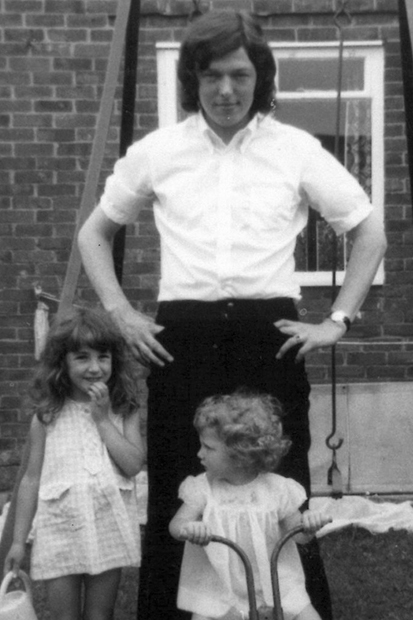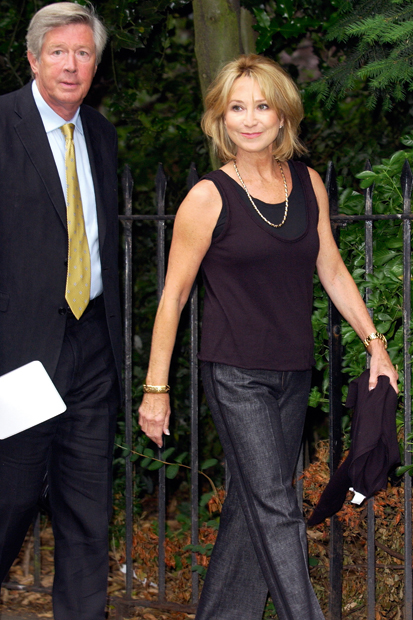Has there ever been a nun or a priest who wasn’t a bent sadist? Because here we go again. At school Paul Merton was terrorised by a nun who, in her black outfit with a white band, ‘looked like an angry pint of Guinness’. She walloped the future comedian if ever she detected an imaginative strain in his English compositions. ‘You can’t write about things that aren’t true,’ asserted this believer in the actuality of virgin births and rising from the dead. For stating that Beethoven invented rice pudding and Mozart baked the first crème brûlée, Merton was told he’d ‘poisoned the minds of your classmates with your ridiculous stories’.
Of course, Merton has been poisoning and entertaining us ever since. His formal education further blighted by the Jesuits — who believed that pain could be equated with learning, and that the only way to teach algebra was with the strap — Merton left his secondary school in Wimbledon and joined the civil service in Tooting. That seemed to last five minutes, because without what appears to be any trouble or effort at all, he’s earning £30 a go for stand-up gigs in pubs and clubs across London, often fitting in five performances a night.
Not for Merton the slog of workingmen’s clubs or holiday camps. Nor did he go to university, which is where Stephen Fry, Hugh Laurie, Emma Thompson and others of his generation got together. Merton, born in 1957 in Parsons Green, and growing up in a small flat with a grumpy grandfather who had a club foot, visited the Comedy Store in Soho, where the great Alexei Sayle was the compère, and after his first shot at performing before an audience, ‘everything I had ever dreamt about had just happened to me’. He even meets and befriends Julian Clary, ‘a very exciting package’.
He goes on Terry Wogan’s chat show (‘a triumph’). Robin Williams says, ‘You were very good.’ Nicholas Parsons invites him to take part in Just a Minute, as ‘You’d be very good on the show.’ Spike Milligan says, ‘Paul, you are a very funny man.’ Eric Idle goes up to him in Peter Cook’s kitchen and announces, ‘I really enjoyed your television series.’ Merton even quotes at length from his own good reviews (‘Merton is emerging as a comic genius, a one-off maverick’), and it dawns on the reader after a while that this must be the most boastful autobiography to have been published in years, especially when we even have to have an endorsement from the sound-effects man: ‘Our sound-effects man told me that our show was the best pilot he had seen in a long time.’
Only a person who is massively lacking in confidence needs to try and get away with such swanking — and I suspect that Merton, the panel game supremo, a household figure after decades on Have I Got News for You, Room 101, Whose Line Is It Anyway? and so on and so forth, is probably actually rather insecure, as Kenneth Williams was, guilty about being, well, a bit lazy. It’s surely a claustrophobic, hellish life, despite the riches that will have accrued, being a professional smart-aleck. As his attempts at re-making some Tony Hancock scripts demonstrated, Merton is no actor. He is linguistically brilliant, but muffled — when I watch him or listen to him he does seem thoroughly, almost agonisingly, bored.
It is no surprise, therefore, to learn that he has had health problems When he broke his leg he also suffered a pulmonary embolism and caught hepatitis from the hospital food. Describing himself, offstage, as now and again ‘buzzing like an electric tea pot’, on at least one occasion he buzzed altogether too much and ended up incarcerated in the Maudsley psychiatric hospital. This is the best chapter in the book — a candid account of panic attacks and paranoia, when Merton thought he was the victim of a Freemason conspiracy. He endured terrifying hallucinations, when ‘thin transparent worms… created intricately invisible patterns before my unseeing eyes’. Talking rapidly and nonsensically, his high level of agitation was eventually ascribed to a bad reaction to anti-malarial pills, but the experience sounds like the psychodrama of all too many a melancholy clown — Sellers, Milligan, Williams (Robin and Kenneth), John Belushi, Barry Humphries — to be merely or exclusively that.
Merton writes perceptively about the comedians he grew up with. While his contemporaries listened to Bowie, Genesis, Pink Floyd, he watched Keaton and Chaplin films. He adored Morecambe and Wise, Brucie, Tommy Cooper, the Goons, and the end-of-the-pier variety world they came from — Winola and Her Syncopated Snakes, Victor Buffoon: Rib Tickler to Royalty. He also recalls trips to the circus as a child. He was unafraid of clowns, ‘with their custard pies, unicycles and backfiring cars that make the doors fall off and strings of sausages lassoing a man in the front row’. This was the sawdust and tinsel world ‘where I wanted to live’, so I can see that sitting behind a desk trading glum and sarcastic ripostes with Ian Hislop (‘a gentleman in every respect’) is something of a disappointment, and doing Just a Minute for eternity in the basement of Broadcasting House is hardly Bertram Mills.
Got something to add? Join the discussion and comment below.
Get 10 issues for just $10
Subscribe to The Spectator Australia today for the next 10 magazine issues, plus full online access, for just $10.
Available from the Spectator Bookshop, £16.50, Tel: 08430 600033
You might disagree with half of it, but you’ll enjoy reading all of it. Try your first month for free, then just $2 a week for the remainder of your first year.














Comments
Don't miss out
Join the conversation with other Spectator Australia readers. Subscribe to leave a comment.
SUBSCRIBEAlready a subscriber? Log in